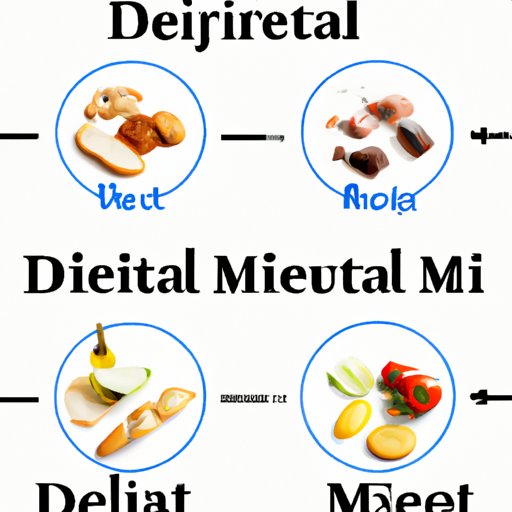Introduction
The Mediterranean diet has become a popular way of eating over the past few years, and for good reason. This way of eating is based on the traditional dietary patterns of people living in the Mediterranean region and emphasizes fresh, seasonal foods. Research has shown that following a Mediterranean diet can have numerous health benefits, making it a great choice for anyone looking to improve their overall health and wellbeing. In this article, we will explore the core components of the Mediterranean diet, how to make it part of your everyday life, cooking tips and recipes, and the science behind this way of eating.

Exploring the Core Components of the Mediterranean Diet
At the heart of the Mediterranean diet are fresh, seasonal fruits and vegetables. These are typically consumed in large quantities and are the main source of carbohydrates. Fruits and vegetables provide essential vitamins, minerals, and antioxidants that are necessary for good health. Whole grains such as quinoa, bulgur, and barley are also an important component of the Mediterranean diet. They are a great source of complex carbohydrates and other nutrients such as fiber, B vitamins, and magnesium.
In addition to plant-based foods, the Mediterranean diet also includes healthy fats such as extra virgin olive oil, nuts, and seeds. These provide essential fatty acids and are a great source of energy. Herbs and spices are also used to flavor dishes and provide additional nutrients. Fish and seafood are eaten two to three times per week, providing high-quality protein and omega-3 fatty acids. Dairy products such as yogurt and cheese are also part of the Mediterranean diet, although they should be consumed in moderation.
How to Make the Mediterranean Diet Part of Your Everyday Life
Making the Mediterranean diet part of your everyday life doesn’t have to be complicated or time-consuming. Here are some tips to get you started:
Meal Planning: Meal planning is an important part of any healthy diet. Start by writing down your meals for the week, then shop for the ingredients you need. Having a plan will help you stay organized and save time throughout the week.
Shopping Tips: When shopping for groceries, focus on fresh, seasonal produce. Look for whole grains such as quinoa, bulgur, and barley, as well as nuts, seeds, and healthy fats like extra virgin olive oil. Try to buy organic whenever possible, as this will provide the most nutrition.
Easy Recipes: Cooking doesn’t have to be complicated or time-consuming. There are plenty of easy recipes that you can make with simple ingredients. Look for recipes that use fresh, seasonal ingredients and focus on whole grains, healthy fats, and lots of vegetables.
Cooking Tips and Recipes for a Mediterranean Diet
Once you have the basics down, it’s time to start exploring some delicious recipes. Here are some tips for creating flavorful Mediterranean dishes:
Appetizers: Appetizers are a great way to start off any meal. Look for recipes that use fresh ingredients such as olives, hummus, roasted peppers, and feta cheese. You can also make simple dishes such as marinated artichokes or grilled zucchini.
Main Dishes: Main dishes are the centerpiece of any meal. Look for recipes that use fresh, seasonal ingredients such as fish, chicken, beans, and vegetables. You can also make pasta dishes, soups, and stews to add variety to your meals.
Side Dishes: Side dishes are a great way to add variety to your meals. Look for recipes that use fresh, seasonal ingredients such as roasted vegetables, couscous, lentils, and quinoa. You can also make salads, tabbouleh, and simple dishes such as roasted potatoes.
Desserts: Desserts don’t have to be unhealthy. Look for recipes that use natural sweeteners such as honey, dates, and maple syrup. You can also make fruit-based desserts such as baked apples, poached pears, and baklava.

The Science Behind the Mediterranean Diet
Numerous studies have shown that following a Mediterranean diet can have numerous health benefits. Eating plant-based foods such as fruits, vegetables, whole grains, and legumes provides essential vitamins, minerals, and antioxidants that are necessary for good health. Additionally, research has shown that consuming fish two to three times per week can reduce the risk of cardiovascular disease and other chronic illnesses. Healthy fats such as extra virgin olive oil, nuts, and seeds provide essential fatty acids and are an important part of the Mediterranean diet.
Debunking Common Misconceptions About the Mediterranean Diet
Despite its popularity, there are still some misconceptions about the Mediterranean diet. It is important to understand that not all Mediterranean diets are the same. Depending on the region, the diet may vary slightly. Additionally, the Mediterranean diet is not necessarily low in calories or fat. While it does emphasize healthy fats, it is important to remember that these should be consumed in moderation. Finally, the Mediterranean diet is not just for weight loss. It is a healthy, balanced way of eating that can provide numerous health benefits.

A Comparison of the Mediterranean Diet to Other Diets
When comparing the Mediterranean diet to other diets, there are some key differences. For example, while the keto diet focuses on high-fat, low-carbohydrate foods, the Mediterranean diet emphasizes plant-based foods such as fruits and vegetables. The vegan diet eliminates all animal products, while the Mediterranean diet includes fish and seafood. Lastly, the Atkins diet is a low-carbohydrate diet that allows for more processed and refined foods than the Mediterranean diet.
Conclusion
The Mediterranean diet is a healthy, balanced way of eating that can provide numerous health benefits. It emphasizes fresh, seasonal fruits and vegetables, whole grains, healthy fats, herbs and spices, and fish and seafood. By incorporating these foods into your everyday life, you can enjoy the many health benefits of the Mediterranean diet.
(Note: Is this article not meeting your expectations? Do you have knowledge or insights to share? Unlock new opportunities and expand your reach by joining our authors team. Click Registration to join us and share your expertise with our readers.)
